
The Cathedral of the Holy Cross and Saint Eulalia, also known as Barcelona Cathedral, is the seat of the Archbishop of Barcelona in Catalonia, Spain. The cathedral was constructed from the thirteenth to fifteenth centuries, with the principal work done in the fourteenth century. The cloister, which encloses the Well of the Geese (Font de les Oques), was completed in 1448. In the late nineteenth century, the neo-Gothic façade was constructed over the nondescript exterior that was common to Catalan churches.
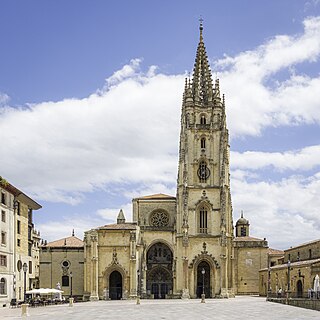
The Metropolitan Cathedral Basilica of the Holy Saviour or Cathedral of San Salvador is a Roman Catholic church and minor basilica in the centre of Oviedo, in the Asturias region of northern Spain.

Villaviciosa is a town and municipality in the autonomous community of Asturias, Spain. José Ángel Hevia Velasco was born in the town. Villaviciosa is important for the production of cider. The town also produces milk and relies on tourism, with natural landscapes and beaches.

Pre-Romanesque architecture in Asturias is framed between the years 711 and 910, the period of the creation and expansion of the kingdom of Asturias.
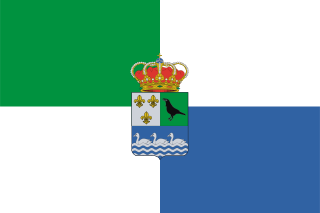
Colunga is a municipality in the Autonomous community of the Principality of Asturias, Spain. It lies on the Cantabrian Sea, and is bordered to the west by Villaviciosa, to the south by Parres and Piloña, and to the east by Caravia.

La Vall de Boí is a municipality and narrow, steep-sided valley in Catalonia. It lies in the Alta Ribagorça county in the Alt Pirineu region, on the edges of the Pyrenees. In 2022, it had a population of 1,090.
Quintueles is one of 41 parishes in Villaviciosa, a municipality within the province and autonomous community of Asturias, in northern Spain.
Selorio is one of 41 parishes in Villaviciosa, a municipality within the province and autonomous community of Asturias, in northern Spain.
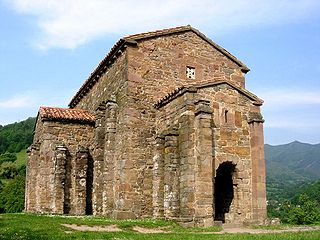
St Christine of Lena is a Roman Catholic Asturian pre-Romanesque church located in the Lena municipality, about 25 km south of Oviedo, Spain, on an old Roman road that joined the lands of the plateau with Asturias.

The church of the Holy Savior of Valdediós is a Roman Catholic pre-romanesque church, located next to Villaviciosa, Asturias, Spain.

The Holy chamber of Oviedo is a Roman Catholic pre-Romanesque church in Oviedo, Spain, built next to pre-romanesque Tower of San Miguel of the city's cathedral. Nowadays, the church occupies the angle between the south arm of the cathedral transept and a side of the cloister.

Church of Santa Eulalia de Ujo is a church in the municipality of Mieres in the community of Asturias, Spain. The church with this name was erected in the 12th century, but it was moved in 1922 to make way for a railroad. Elements of the original Romanesque church, including the main portal and parts of the apse were incorporated into the present church.

The Church of San Jorge of Manzaneda is a church in Gozón, Spain. It is small in size, but it constitutes a notable example of Asturian Romanesque architecture. It was created during the classical period in the late 12th and early 13th centuries. It is small in size and significant for its architecture and its surrounding environment which has barely changed.
Iglesia de Santa María (Valdediós) is a church in Villaviciosa, Asturias, Spain. It is within the Monasterio de Santa María de Valdediós. The only three Romanesque altars in Asturias are preserved in the church.
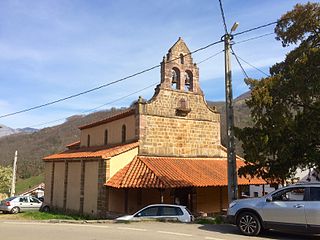
The Church of Santa María de Villanueva is a Romanesque-style, Roman Catholic parish church in the diocese of Villanueva, in the municipality of Teverga, community of Asturias, Spain.

Iglesia de Santa María de la Oliva is a late 13th to early 14th century stone church in Villaviciosa of the autonomous community of the Principality of Asturias, in Spain. The church and town is on the coast of Biscay Bay in northern Spain.

Monasterio de Santa María de Valdediós is a 13th-century Cistercian monastery near Villaviciosa of the autonomous community of the Principality of Asturias, in Spain. The monastery and town is on the coast of Biscay Bay in northern Spain.
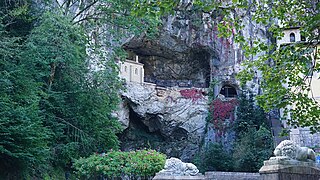
The Santa Cueva de Covadonga is a Catholic sanctuary located in Asturias, northern Spain. It is a cave in the Picos de Europa mountains, which gives its name to the parish of Covadonga in the municipality of Cangas de Onís. The name refers to the sanctuary, dedicated to the Virgin of Covadonga, where the first battle of the Reconquista took place in 718.
Oles is one of 41 parishes in Villaviciosa, a municipality within the province and autonomous community of Asturias, in coastal northern Spain.
















